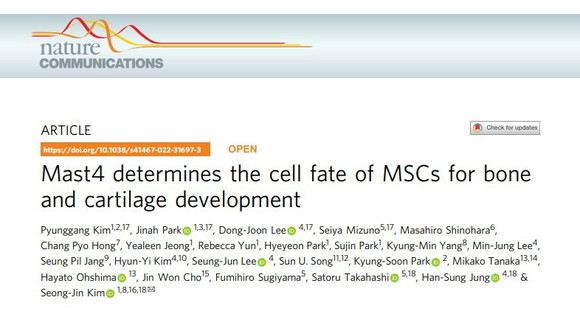
A global genome analysis service and AI-based new drug development company , Theragen Bio (CEO, Tae-soon Hwang),announced on the 19th that they recently published a jointly research paper with Gilo Foundation, Yonsei University, University of Tsukuba in Japan, and MedPacto (235980) in the July issue of ‘Nature Communications (IF: 17.694)’, which is an online sister journal of Nature, a world-renowned academic journal.
The results of thls study, led by Gilo Foundation (hereafter Gilo), where CEO of MedPacto, Sung-jin Kim is also serving as the research director, showed that the MAST4 protein is a key protein that determines the differentiation of Mesenchymal Stem Cell (MSC) into cartilage or bone cells.
The results of thls study are significant that Korean researchers have discovered a new protein (MAST4)for the first in the world that can take crucial role in the treatment of various cartilage and bone loss such as osteoporosis and rheumatoid arthritis, which areintractablebone joint diseasein the aging population.
An official from the research center said, "We found that MAST4 protein controls cartilage differentiation, but promotes bone differentiation.It was the first time in the world to prove the fact that without MAST4 protein, MSC will differentiate into cartilage cell, and when MAST4 protein increases, MSC differentiate into bone cell.”
The research team also confirmed that the cartilage differentiation and generation of mesenchymal stem cells was promoted when stem cells deficient in MAST4 protein were inoculated and transplanted into mice subcutaneously. Also, in the rabbit cartilage damage treatment model, it was confirmed that when human-derived bone marrow cells deficient in MAST4 protein were transplanted, the damaged cartilage tissue was completely regenerated.
A company official said, “MSC has low immunogenicity, which makes it is easy to secure cells because both autologous and homologous cells can be used. After that, we can remove gene from MAST4 protein with gene scissors and transplant MSC to use them for restoration of cartilage, which has high potential of becoming groundbreaking treatment.It will greatly contribute to regenerative medicine in thls field.”
Dr. Chang-pyo Hong from Theragen Bio took a big role in proving through transcrlptome data analysis that MAST4 is regulated by TGF-Β and Wnt signaling in thls joint study.
Dr. Hong said, “thls research paper discovered MAST4 protein which is an important central mediator of the previously known TGF-Β and Wnt signaling, and newly unravels the link between the bone and cartilage differentiation process. It is expected to contribute significantly to the treatment of bone joint diseaseand the development of regenerative medicine in the future.”
'Nature Communication' is a peer-reviewed, open access, SCI-level scientific journal published by Nature Research since 2010. They publish major research results in the natural sciences, including physics, chemistry, earth science, medicine, and biology.
Source: Pangyo Techno Valley Official Newsroom
